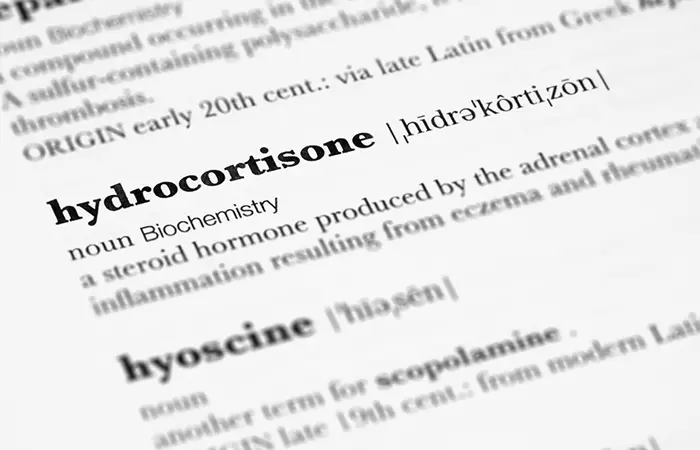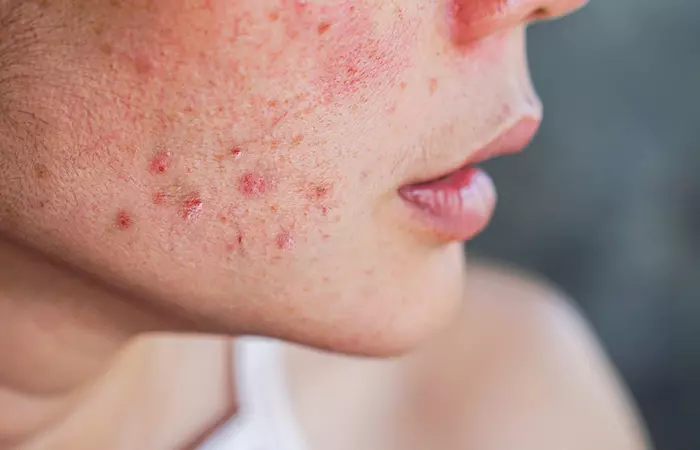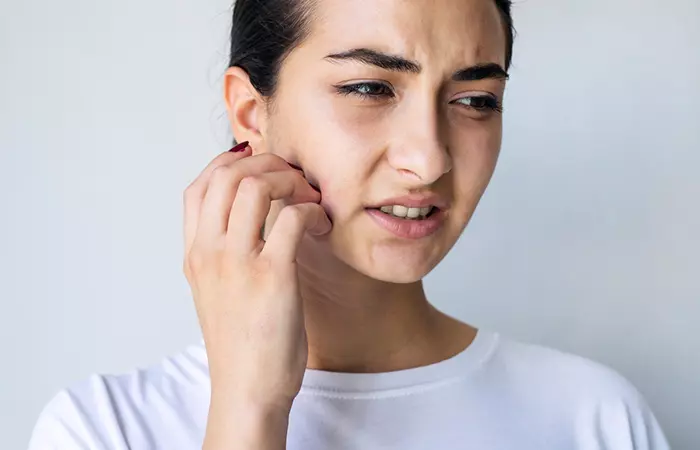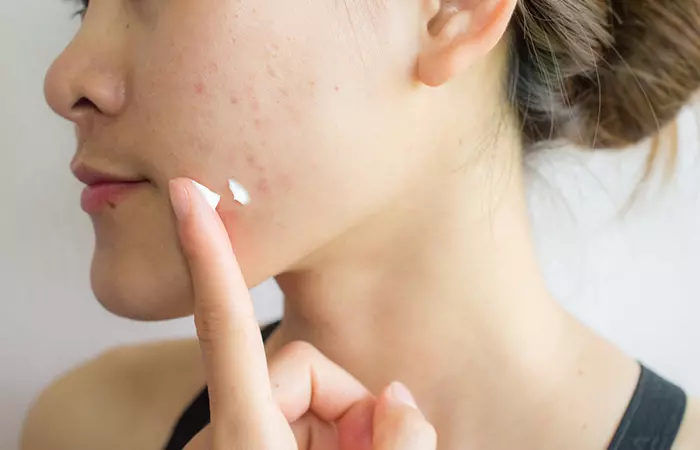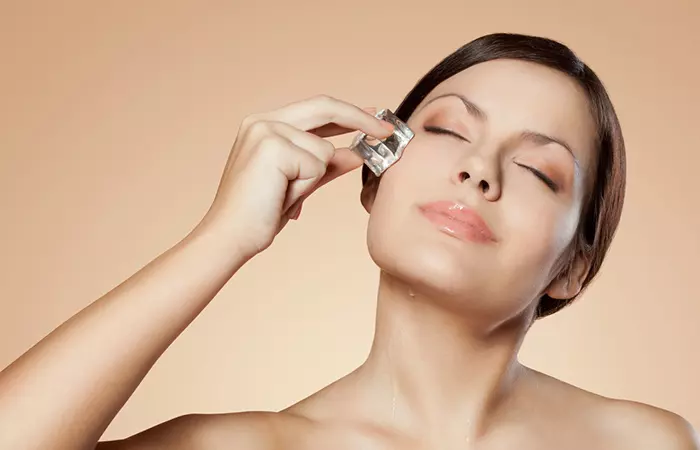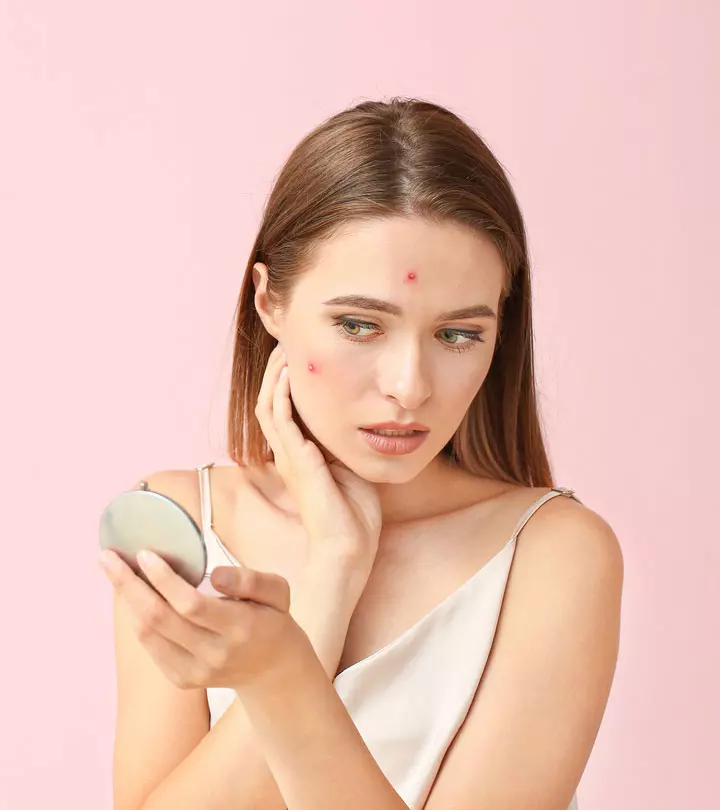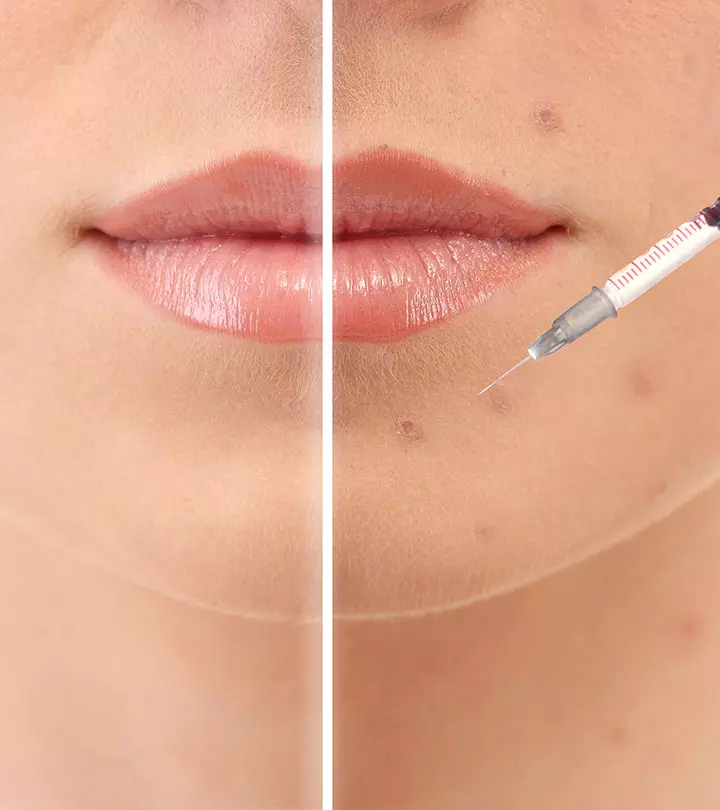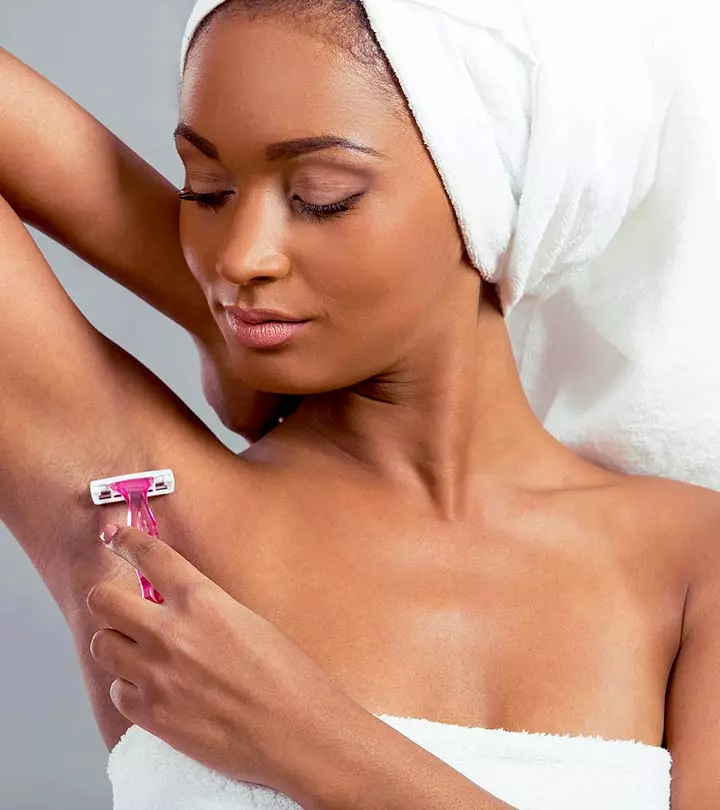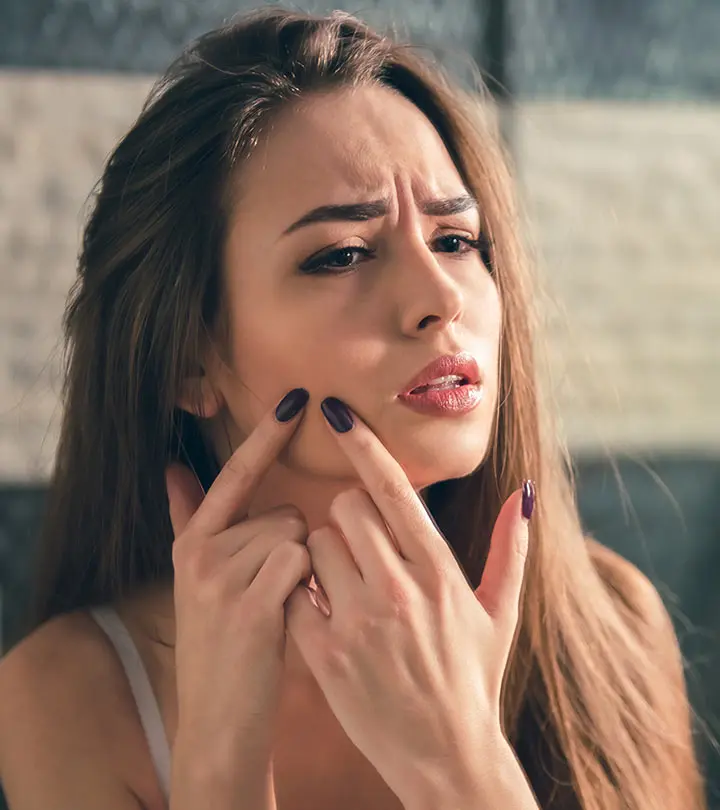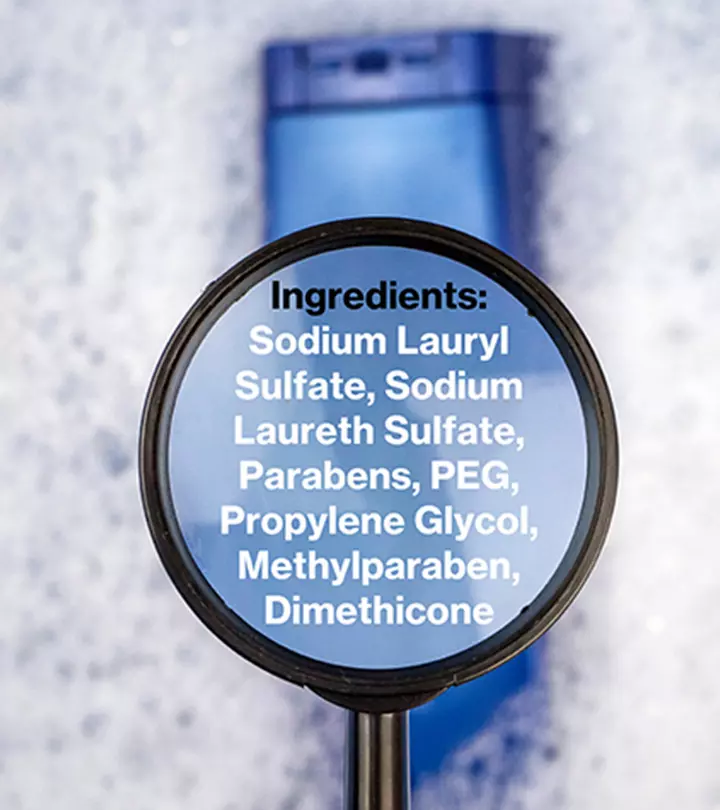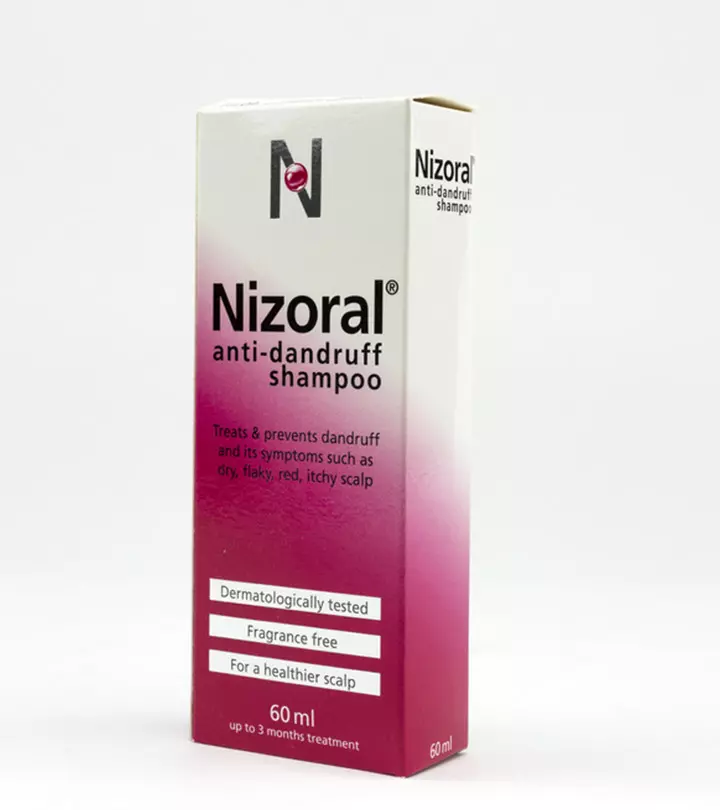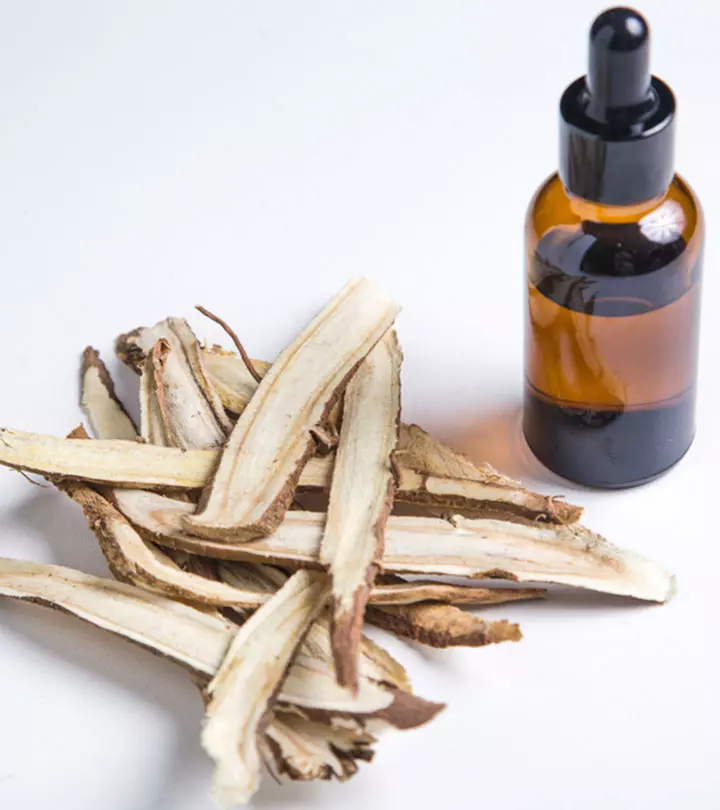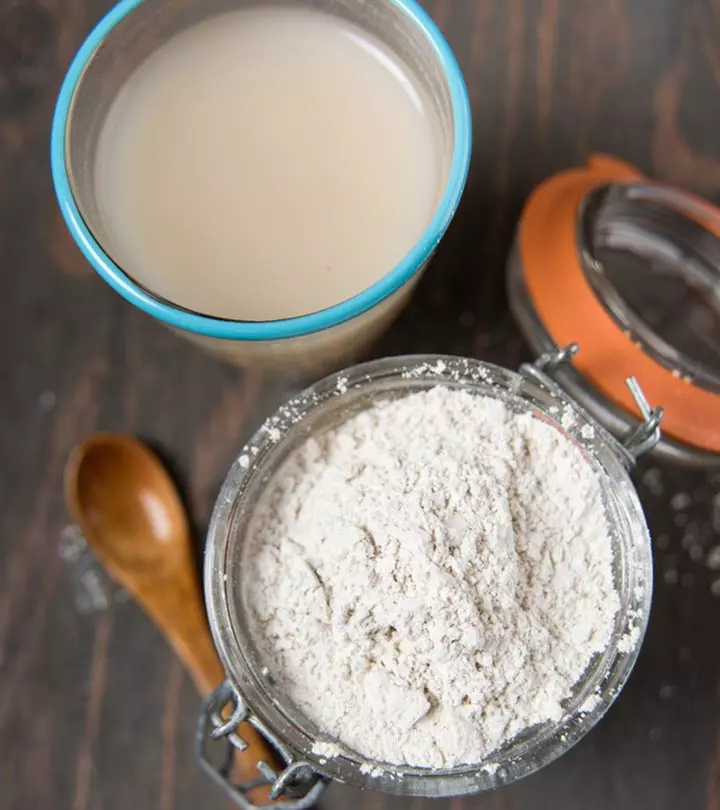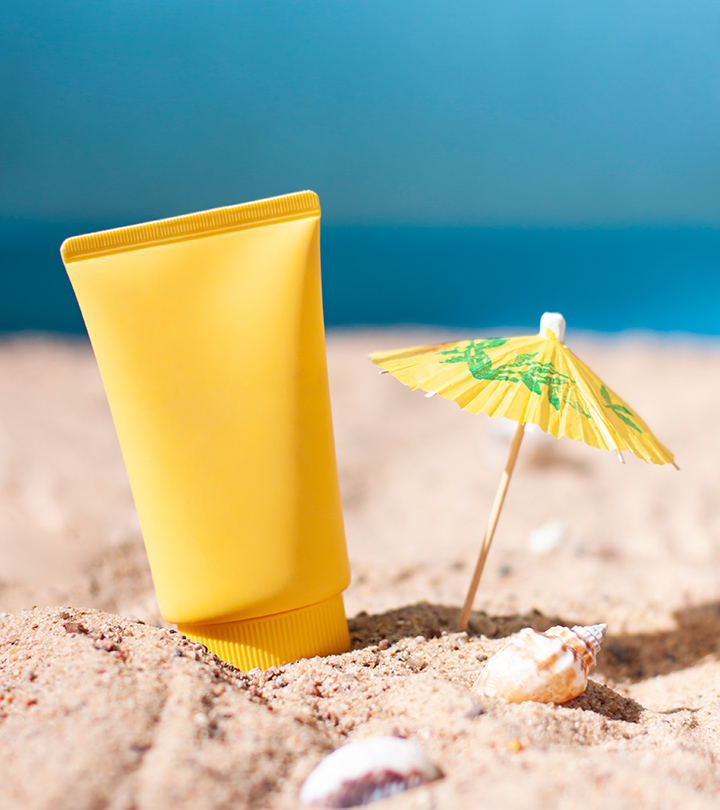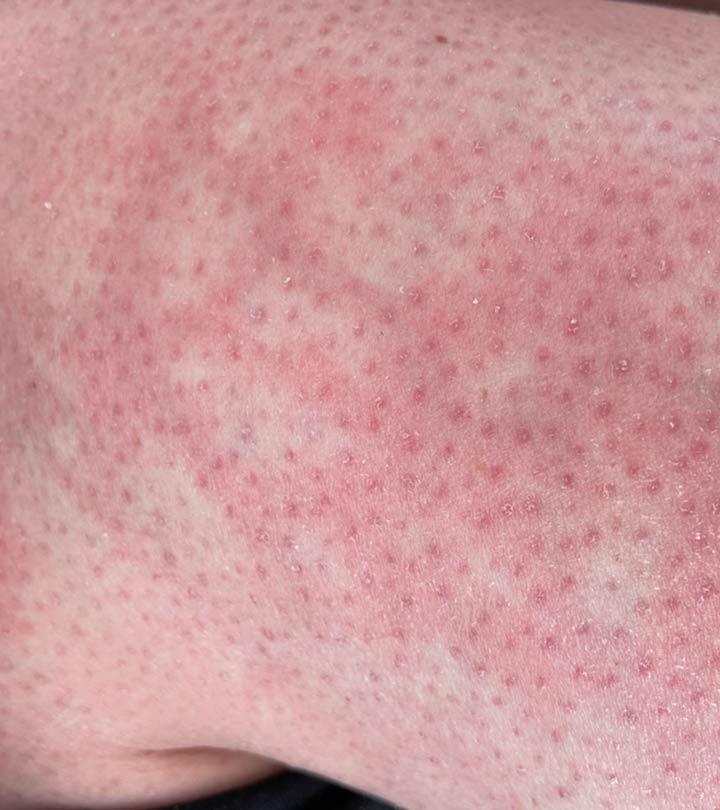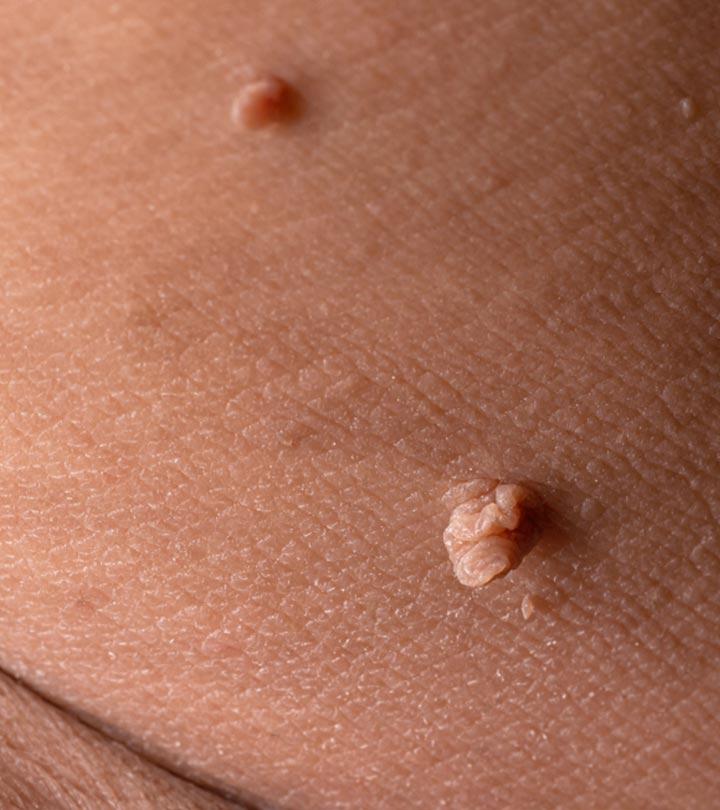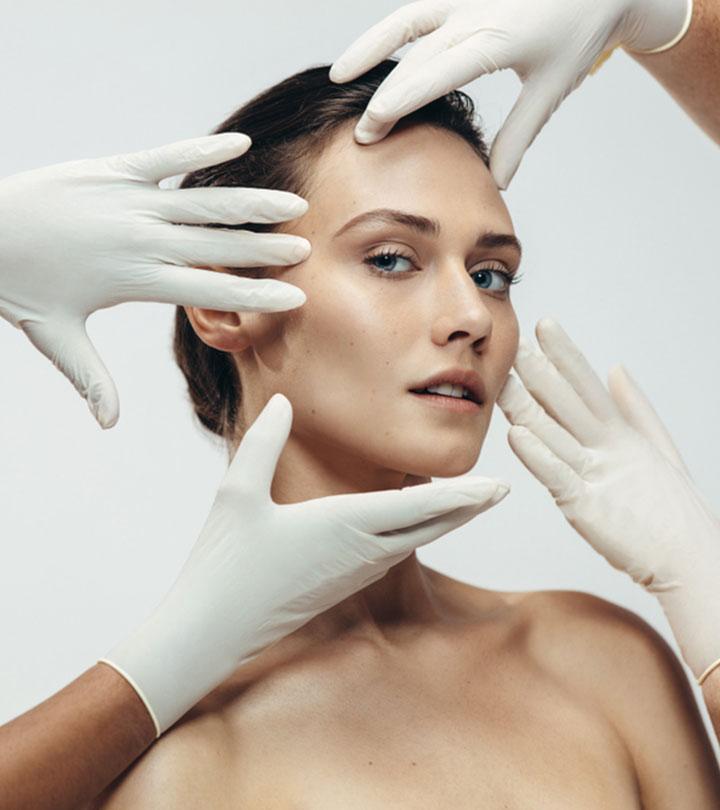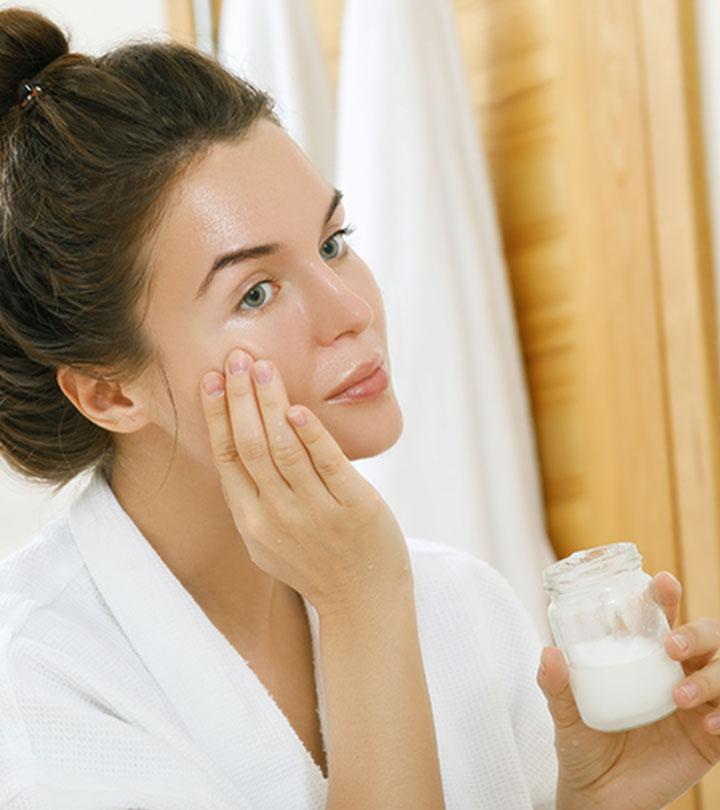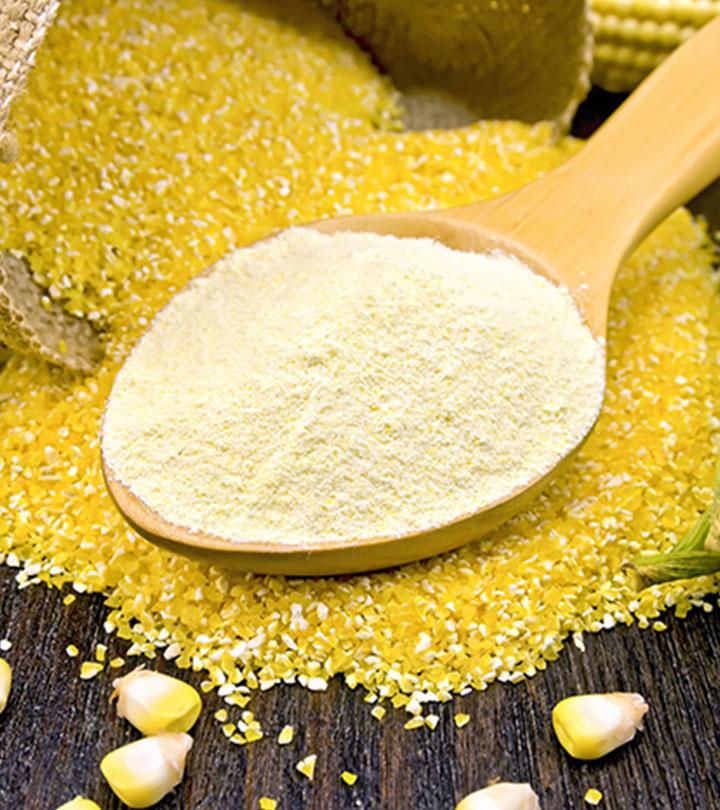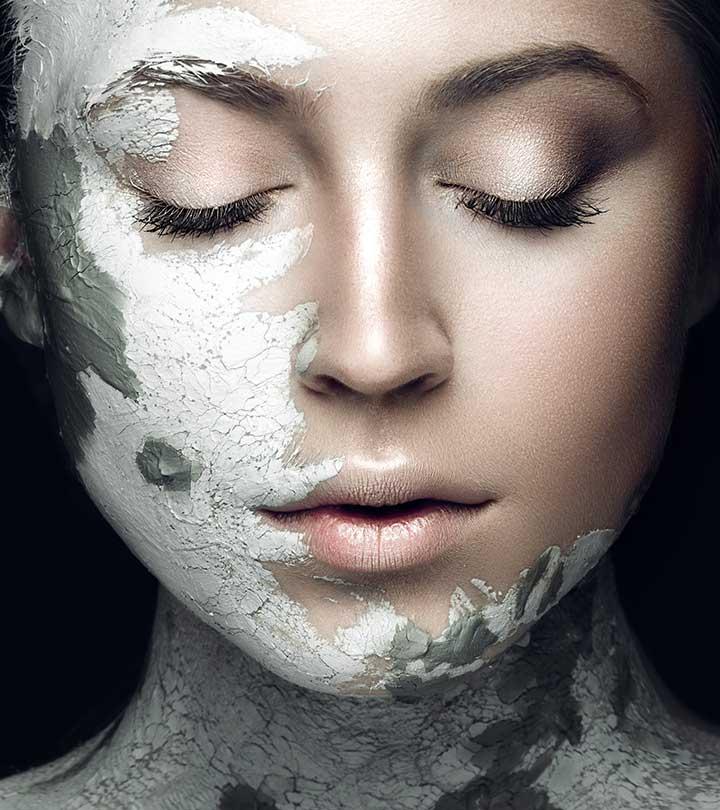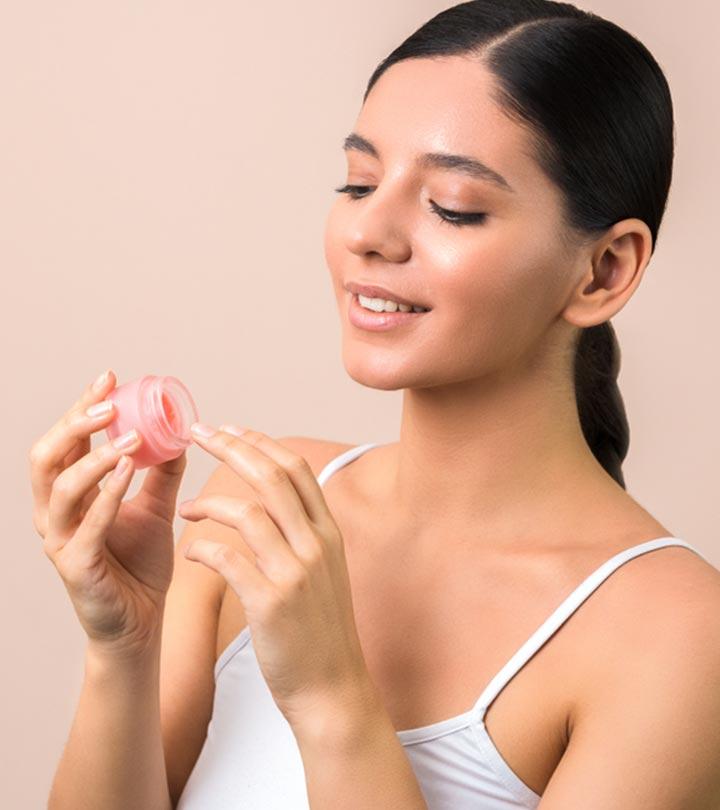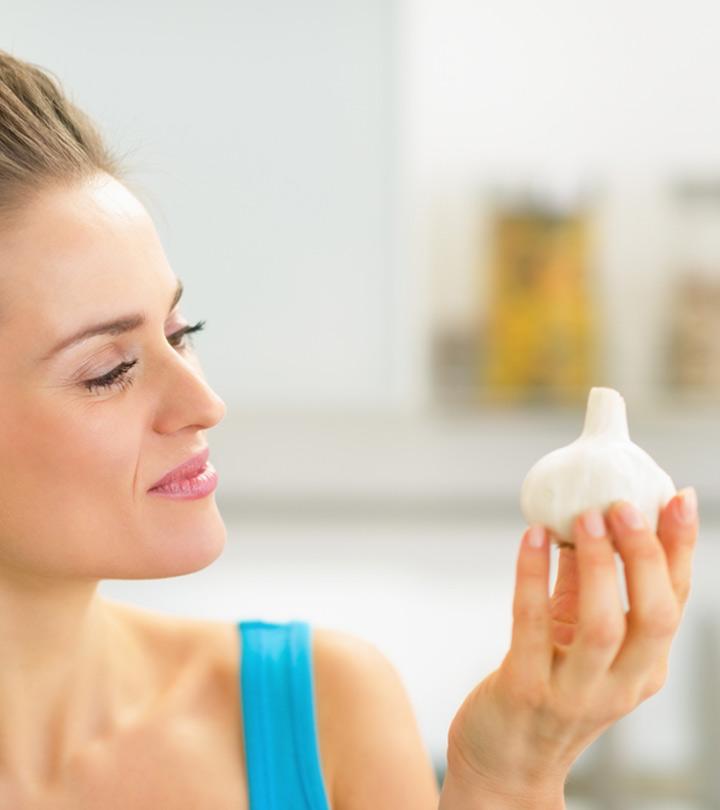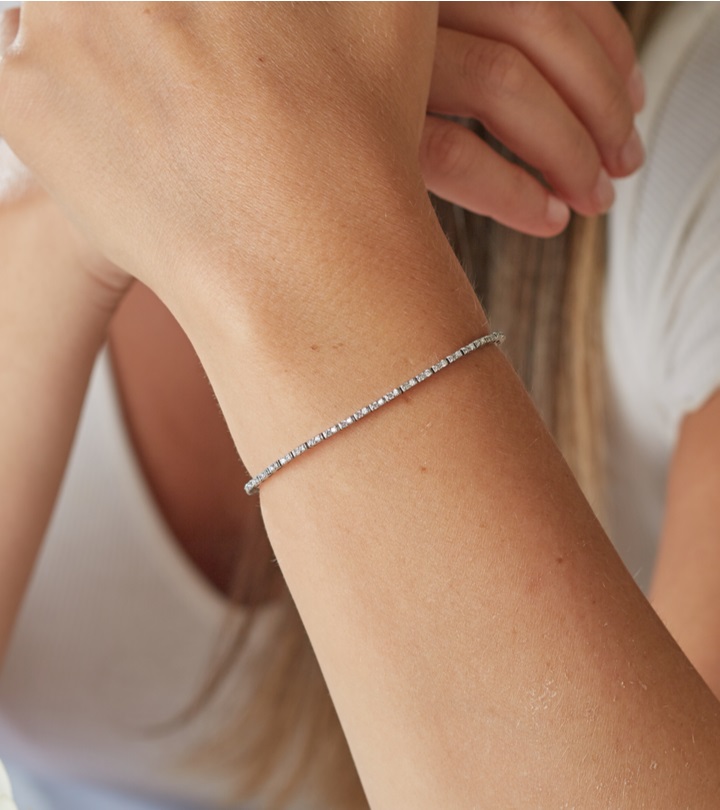What Is Hydrocortisone? Does It Work For Acne?
Knowing the right dosage and usage of this medication will help you combat your acne safely.
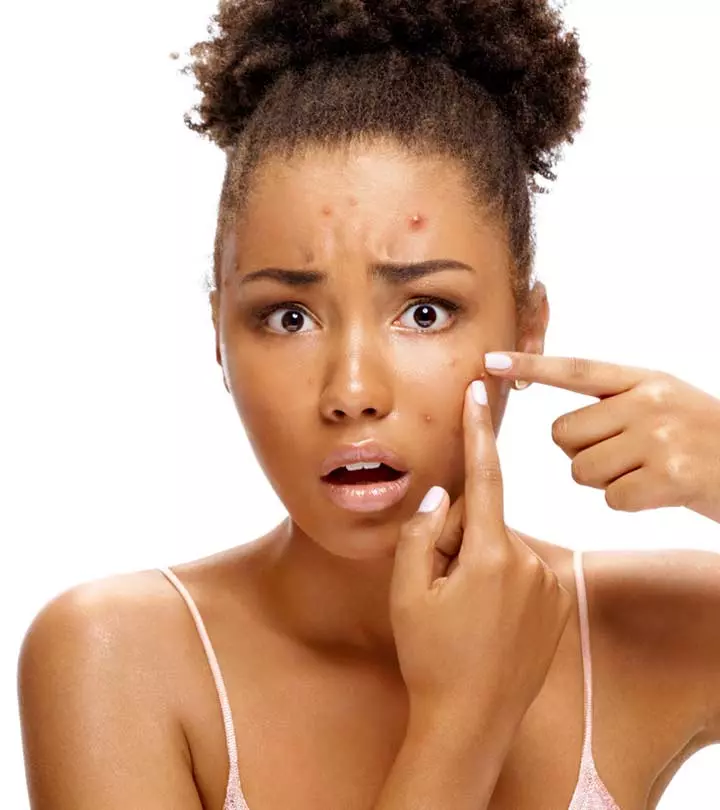
Image: Shutterstock
Acne vulgaris is a prevalent skin condition that may affect people of all ages. Unfortunately, since cystic, pustular, nodular, and hormonal acne require medical assistance, most of us turn to questionable ingredients for spot treatment. One such ingredient is hydrocortisone. But, can you use hydrocortisone for acne?
This corticosteroid is not a traditional acne ointment. It is often used to relieve the itching, swelling, and irritation caused by skin issues like eczemai A chronic allergic and inflammatory skin condition that causes itchy, red, bumpy, and cracked skin and rashes. , psoriasis, and insect bites (1). Although this synthetic acne cream does not cure acne, it can help to minimize pain and irritation. This article delves into how hydrocortisone may help with acne, its safety and hazards, and safer options. Keep scrolling!
In This Article
What Is Hydrocortisone?
Hydrocortisone is a corticosteroid and helps reduce skin inflammation. Cortisol is a steroid hormone and when it is used as a medication, it is called hydrocortisone. This mild OTC steroid is mostly used for relieving itchy or irritated skin due to rashes and bug bites. Although it is often used to relieve acne, hydrocortisone is not a conventional acne medication as it does not affect the acne-causing bacteria or sebum production as well as other hormonal factors and help in acne prevention. Then, how does it work? Scroll further to understand.
 Trivia
TriviaHydrocortisone For Acne: Does It Work?
Hydrocortisone cream is not prescribed as an acne treatment. However, one may use it to reduce the inflammation, redness, and discomfort caused by acne. Like any topical corticosteroid, hydrocortisone has anti-inflammatory effects and can provide temporary relief by reducing inflammation.
Steroids like hydrocortisone work well with topical acne medication like benzoyl peroxide (2). However, when used alone, hydrocortisone may cause adverse effects. Here are some safety aspects to consider before using this topical steroid.
Is It Safe To Use Topical Hydrocortisone For Acne?
The Food and Drug Administration (FDA) approves topical hydrocortisone as a prescription drug to treat inflammatory acne-prone skin conditions (3). While topical corticosteroidsi A class of human-made, anti-inflammatory medicines meant for asthma, allergies, and inflammatory bowel disease. may work well with acne medication, steroids often mask the infection and increase the risk of delayed diagnosis and treatment if used alone. The immunosuppressive effects of the corticosteroid may also increase the risk of developing persistent fungal infection (1).
Excessive or prolonged use of hydrocortisone may cause:
- Burning sensation
- Flaking and dryness
- Itching
- Redness
- Swelling and scaling
- Blistering
Improper use can also lead to atrophy, striae, rosacea, perioral dermatitisi A skin condition characterized by an inflammatory or red rash around the mouth, which tends to be scaly. , acne breakouts, and purpura. Hypertrichosis, pigment alteration, delayed wound healing, and exacerbation of skin infections are less common side effects (4).
However, you can minimize the side effects by using hydrocortisone cream for acne management in the prescribed manner by your dermatologist.
The Right Way Of Using Topical Hydrocortisone For Acne
Hydrocortisone is available in many forms, including oral tablets, injections, and topical ointments. However, do not self-medicate and use topical steroids without consulting an expert in dermatology.
There is no standard dosage, and you must follow the doctor’s instructions. They may prescribe hydrocortisone as a part of combination therapy for acne.
- Prescription Topical Cream Of 1% Strength
You may apply a thin layer of the cream to the affected area 2-3 times a day or as directed by the doctor. Stop using the product if you do not see any improvement after one week or experience any adverse effect.
- OTC Topical Cream Of 0.5% Strength
You may apply a thin layer of the cream to affected areas 3-4 times a day or as prescribed by the doctor. Never use the product for more than a week at a stretch.
Avoid using hydrocortisone:
- If you are pregnant or breastfeeding.
- On kids and infants (for diaper rash or other issues).
- If you are on aspirin, anticoagulantsi A group of medications or chemical substances that prevent or decrease the ability of blood to clot. , or birth control pills.
- If you have a history of liver, kidney, or heart disease.
To avoid these side effects, you must use the steroid as recommended by the dermatologist and not longer than the recommended duration.
How Long Can You Use Hydrocortisone For Acne?
Do not use hydrocortisone for more than a week at a stretch. Avoid using it on your face unless the doctor prescribes it.
However, never stop it without consulting your doctor. Discontinuing a steroid cream too quickly may cause serious rebound reactions. Learn more about it in the next section.
What Happens If You Stop Taking Hydrocortisone?
Discontinuing the prolonged use of mid- to high-potency topical corticosteroids may cause serious skin reactions (a phenomenon called topical steroid withdrawal). Some such common skin reactions include skin sensitivity, redness, skin burning, excessive skin flaking, insomnia, and severe itching. In extreme cases, some individuals may also experience anxiety and depression, including suicidal thoughts (5). Therefore, always seek advice from your doctor before starting or stopping hydrocortisone.
Dezi Ray, a Youtuber, explains how her skin suffered from the use of hydrocortisone. She reveals that she had been using this topical steroid for 9 years and stopped it recently. Within 3 months, her skin had become too dry and flared up with dark spots. She added, “This topical steroid withdrawal is the type of thing that makes you wanna stay in the house until it is cleared up, and it might take a whole year to clear up. So don’t let that be you; get rid of the hydrocortisone as soon as you can and find some natural remedies…(i).”
You may also consider these safer alternatives to soothe acne and pimples at home.
Safer Alternatives For Soothing Pimples At Home
- Use Ice Cubes: If you experience swelling or irritation, applying an ice cube on the pimple for a few seconds. This will constrict the small blood vessels to reduce redness and swelling.
- Use A Salicylic Acid-Based OTC Solution: Salicylic acid is used for treating mild to moderate acne. It is a safe alternative for acne solution and to clean the pores. You may also try a salicylic acid acne patch to reduce the redness and inflammation.
- Take An Oral Pain Reliever: Oral medications like ibuprofen can help relieve pain and irritation. However, , these acne remedies will not treat your acne but help in pain relief associated with it.
- Drink a lot of water, eat fresh fruits and salads, and avoid high caloric, fried, processed foods.
 Quick Tip
Quick TipInfographic: How To Use Topical Hydrocortisone For Acne
Dealing with acne can be frustrating and affects your self-confidence. If you are looking for an effective solution to combat those pesky breakouts, topical hydrocortisone might be the answer. Learn how to use it for acne and the precautions to keep in mind. Check out the infographic below and unlock the path to clearer and healthier skin!

Illustration: StyleCraze Design Team
Hydrocortisone is a corticosteroid commonly used for treating itching and inflammation associated with skin conditions such as eczemai A chronic allergic and inflammatory skin condition that causes itchy, red, bumpy, and cracked skin and rashes. and psoriasis. Available as a pill, ointment, or injections, you can use hydrocortisone for acne in combination with acne medications. Exercise caution while using the hydrocortisone as over-exposure may result in swelling, redness, dryness, and itching. If you are unsure of using hydrocortisone, consult a doctor or opt for a safer alternative such as the application of ice cubes and oral pain medication for managing the symptoms of acne.
Frequently Asked Questions
Does hydrocortisone lighten skin?
Yes, topical corticosteroidsi A class of human-made, anti-inflammatory medicines meant for asthma, allergies, and inflammatory bowel disease. such as hydrocortisone may help lighten skin and acne scars (6). However, it is advisable to use it under the guidance of a skin care professional.
Is cortizone 10 the same as hydrocortisone?
Cortizone 10 is the name of an over-the-counter anti-itch brand that contains hydrocortisone, a chemical ingredient.
Does hydrocortisone affect sleep?
Yes, hydrocortisone may affect REM sleep (7). However, the study was conducted on oral hydrocortisone use and there is insufficient evidence regarding the effect of topical hydrocortisone on sleep.
Is hydrocortisone an antifungal?
No, hydrocortisone is not antifungal but it may sometimes be used in conjunction with antifungal creams.
Is hydrocortisone an antibiotic?
No, hydrocortisone is not antibiotic but it may be used with antibiotic ointments in some cases.
Key Takeaways
- Hydrocortisone is a corticosteroid that aids in reducing inflammation reduction.
- Hydrocortisone cream is not recommended as an acne treatment, though it can be used to relieve acne inflammation, redness, and pain.
- Excessive or extended usage of hydrocortisone can result in burning, peeling, dryness, itching, irritation, swelling, scaling, and blistering.
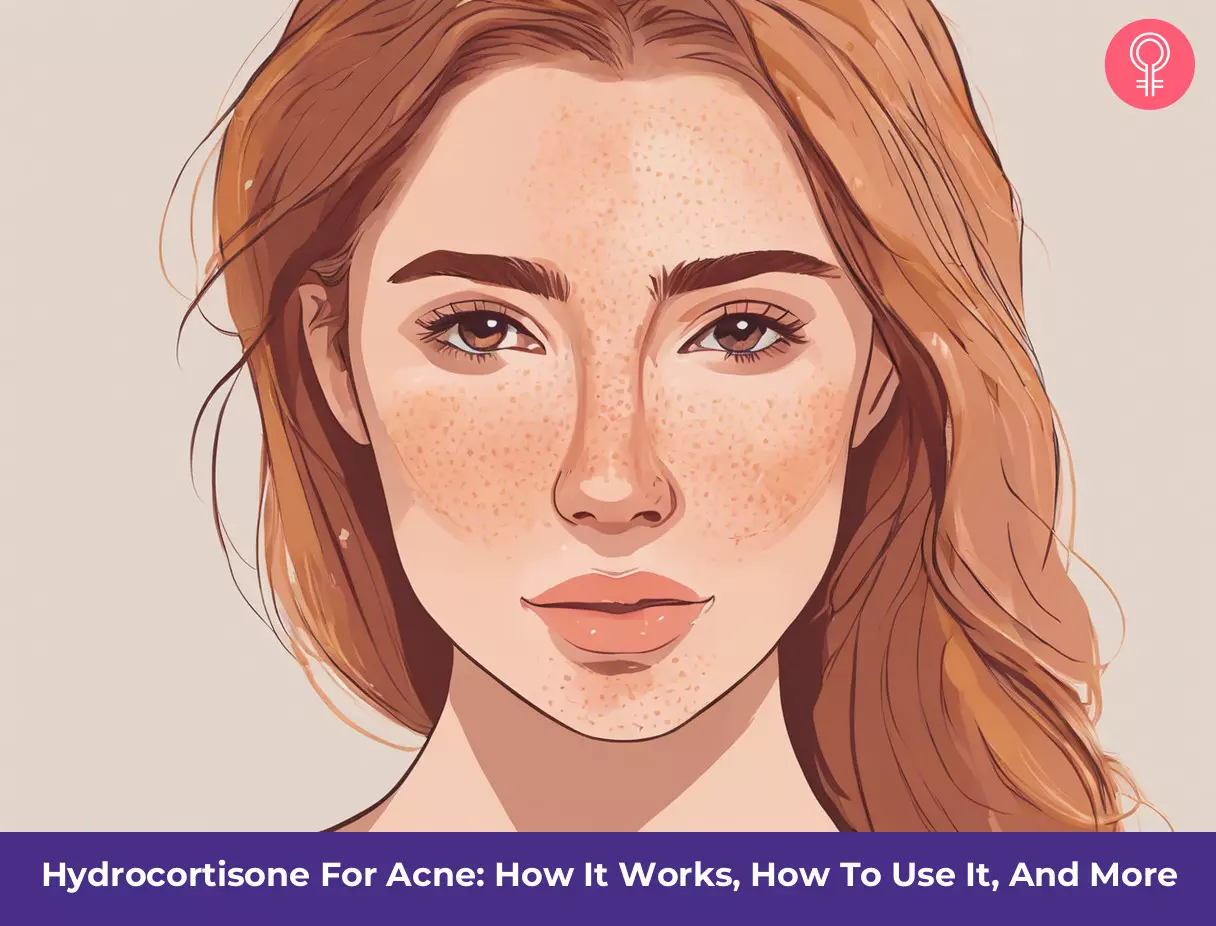
Image: Stable Diffusion/StyleCraze Design Team
Hydrocortisone is a steroid used to treat a variety of skin conditions. Watch this video to learn why it’s important, how and why to use it and whether it’s right for you.
Personal Experience: Source
StyleCraze's articles are interwoven with authentic personal narratives that provide depth and resonance to our content. Below are the sources of the personal accounts referenced in this article.
i. STOP using Hydrocortisone on your face!!
https://www.youtube.com/watch?v=FvUry78Par8
References
Articles on StyleCraze are backed by verified information from peer-reviewed and academic research papers, reputed organizations, research institutions, and medical associations to ensure accuracy and relevance. Read our editorial policy to learn more.
- Hydrocortisone for skin
https://www.nhs.uk/medicines/hydrocortisone-skin-cream/ - Benzoyl peroxide in the treatment of acne vulgaris: a double-blind, multi-centre comparative study of Quinoderm cream andQuinoderm cream with hydrocortisone versus their base vehicle alone and a benzoyl peroxide only gel preparation
https://www.tandfonline.com/doi/abs/10.1185/03007998909115932 - Drugs@FDA: FDA-Approved Drugs
https://www.accessdata.fda.gov/scripts/cder/daf/index.cfm?event=overview.process&applno=085025 - Side-effects of topical steroids: A long overdue revisit
https://www.ncbi.nlm.nih.gov/pmc/articles/PMC4228634/ - Topical steroid withdrawal: an emerging clinical problem
https://pubmed.ncbi.nlm.nih.gov/37119282/ - Misuse of topical corticosteroids: A clinical study of adverse effects
https://www.ncbi.nlm.nih.gov/pmc/articles/PMC4228636/ - Effects of hydrocortisone on brain 5-HT function and sleep
https://pubmed.ncbi.nlm.nih.gov/7829766/
Read full bio of Dr. M. Khawar Nazir
Read full bio of Eshna Das
Read full bio of Shiboli Chakraborti





